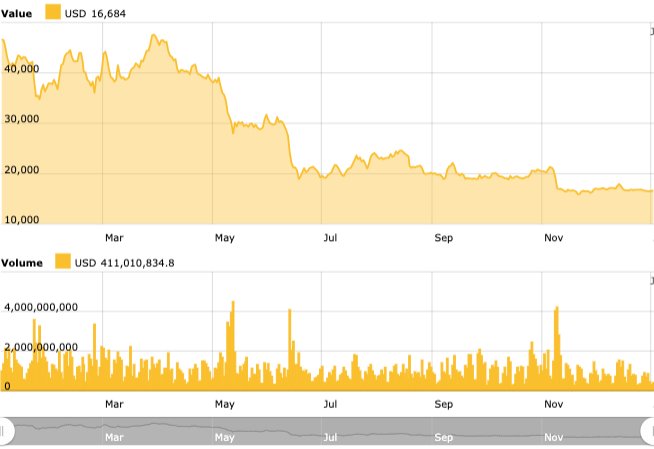Bitcoin (BTC) had a bumpy ride throughout 2022, along with the rest of the digital asset market. The cryptocurrency began the year exchanging hands around $46,700 and is currently trading over 64% down at $16,560 at the time of writing. Consequently, the coin’s market capitalization took a tumble from around $900 billion on Jan. 1, 2022 to end the year at around $320 billion.

While Bitcoin’s drop in price could be attributed to the extraordinary circumstances that the entire cryptocurrency market has been through this year, it is important to reevaluate the 2022 price predictions made by various market entities. One of the most popular predictions was that of analyst PlanB’s Bitcoin Stock-to-Flow (S2F) model.
The S2F model predicted BTC to be at nearly $110,000 as of December 2022. The cryptocurrency finished the year trading at almost 85% off target, which raises questions about the validity of the price model. Stock-to-flow models are generally used to price commodities in the traditional markets, as they account for two variables related to an asset: stock and flow. “Stock” refers to the total existing supply of the asset, and “flow” refers to the new supply of the asset created each year.

Antoni Trenchev, co-founder and managing partner of Nexo — a digital asset management platform — shared with Cointelegraph his thoughts on the validity of the S2F prediction model:
“There are many factors that can influence the price of Bitcoin, including market demand, regulatory changes and technological developments. The S2F model is one tool that can be used to make projections about the future price of Bitcoin, but it is important to keep in mind that it is based on certain assumptions and is not a definitive guide to the future.”
Besides S2F, other models have been used to attempt to predict the price of Bitcoin in the near and distant future. Two popular ones are Elliott Wave Theory and Hyperwave Theory. While both also find their roots in traditional financial markets, their success in predicting the price of BTC has been relatively limited as well.
Price models fail as a new year for Bitcoin ushers in
Considering that Bitcoin only began its journey as an asset just over a decade ago, it is safe to say that the cryptocurrency is still in its nascent stages of price discovery when compared with commodities like gold or silver and other leading technology stocks like Apple and Microsoft. Thus, while there are various BTC price predictions, it is essential to remember the limited availability of cyclical data to factor into these models.
Trenchev added that there are many different models and approaches that can be used to try to predict the price of Bitcoin. Some people use technical analysis, which involves studying historical price and volume data to identify patterns and trends. Others use fundamental analysis, which involves evaluating the underlying factors that can affect an asset’s demand and supply. No single model or approach is universally considered to be the most reliable for predicting the price of Bitcoin, and it is crucial to consider a range of factors when making any investment decisions.
Related: The Three Most Controversial Bitcoin Price Models and What They Predict
Alex McCurry, CEO and co-founder of blockchain solution provider Solidity.io, agrees with Trenchev, telling Cointelegraph, “Bitcoin is a completely unpredictable asset. The only thing one can be certain of when it comes to Bitcoin is the underlying fundamental value of the Bitcoin network and the value it presents to holders and investors. Because of this, one can predict long-term adoption and value in the macroeconomic climate over time, but perfectly timing an exact price is impossible.”
However, one important aspect could change the trends for the price of Bitcoin: utility.
Since Bitcoin is not a smart contract-compatible network, the asset’s utility has been limited to a payment rail. That is slowly beginning to change, with Bitcoin now finding more utility than ever before, supported by the Lightning Network.
LN is a layer-2 payment protocol built on top of the Bitcoin network that enables fast, seamless peer-to-peer transactions. It helps improve the scalability of the network enormously. Most recently, Michael Saylor’s MicroStrategy announced that it plans to release Lightning Network-powered software and solutions in 2023.

MicroStrategy also continues adding Bitcoin to its treasury. Between Nov. 1 and Dec. 21, 2022, the company acquired 2,395 BTC at an average price of $17,181 for a total of $42.8 million. For tax reasons, it sold 704 BTC at $16,776 per coin for a total of $11.8 million on Dec. 22. As a repurchase, the company bought 810 BTC on Dec. 24 for $13.6 million in cash. According to data from BitcoinTreasuries, this puts the firm’s holdings at 132,500 BTC, worth around $2.2 billion at the time of writing.
Global investment manager VanEck released 11 crypto predictions for 2023, among which it claimed that BTC will drop to $10,000–$12,000 in Q1 “amid a wave of miner bankruptcies” and will bounce back up to $30,000 in the second half of 2023.
McCurry agreed with this prediction, stating, “I believe Bitcoin will bounce back in 2023, and I feel that by 2024, Bitcoin will achieve a new all-time high significantly higher than the 2021 peak of $69,000.”
Trenchev added, “It is possible that the price of Bitcoin could rebound to $30,000 in the second half of 2023, but it is also important to keep in mind that the price of Bitcoin is highly volatile and can be affected by a wide range of factors.”
Derivatives market and BTC price discovery
Despite the unpredictable, volatile nature of Bitcoin’s price, the asset’s derivatives market is an important indicator of its current and future sentiment.
According to data from Coinglass, the Bitcoin futures market currently has an open interest (OI) of over $9 billion. At the same time, the open interest of the Bitcoin options market stands at $3.4 billion, with over 76% of the OI on cryptocurrency derivatives exchange Deribit.
Luuk Strijers, chief commercial officer of Deribit, spoke with Cointelegraph about what options data for 2023 reveals about the market’s price sentiment for Bitcoin. He said:
“The overall put-call ratio for June 2023 is 0.24, which is rather low. This typically implies bullish sentiment, as there are three times more calls outstanding than puts. Max pain is at $19,000, also showing upside potential. Investors are positioning at the larger strikes ($20,000, $25,000 and $30,000). The premium for the higher strikes is much lower, obviously, so these could be seen as an upside bet, or used for yield generation by call sellers.”
The max-pain price is the price point at which the largest number of options are in loss. Strijers also added that “since the FTX implosion, investors seem to be on the sidelines, waiting for news about the industry, but also macroeconomic news. We have experienced new lows in the implied volatilities, and the short term is currently trading in the low 30s. We’re even having dailies seen trading below 30%. At the same time, liquidity is currently lower than normal.”
Market uncertainty aside, incoming regulations in 2023 — namely, the European Union’s Markets in Crypto Assets bill and the United States’ Lummis-Gillibrand and Warren-Marshall bills — could bring stability to the market, as investors who feel the space is provided with more oversight will likely feel more confident.
This article does not contain investment advice or recommendations. Every investment and trading move involves risk, and readers should conduct their own research when making a decision.



Comments (No)